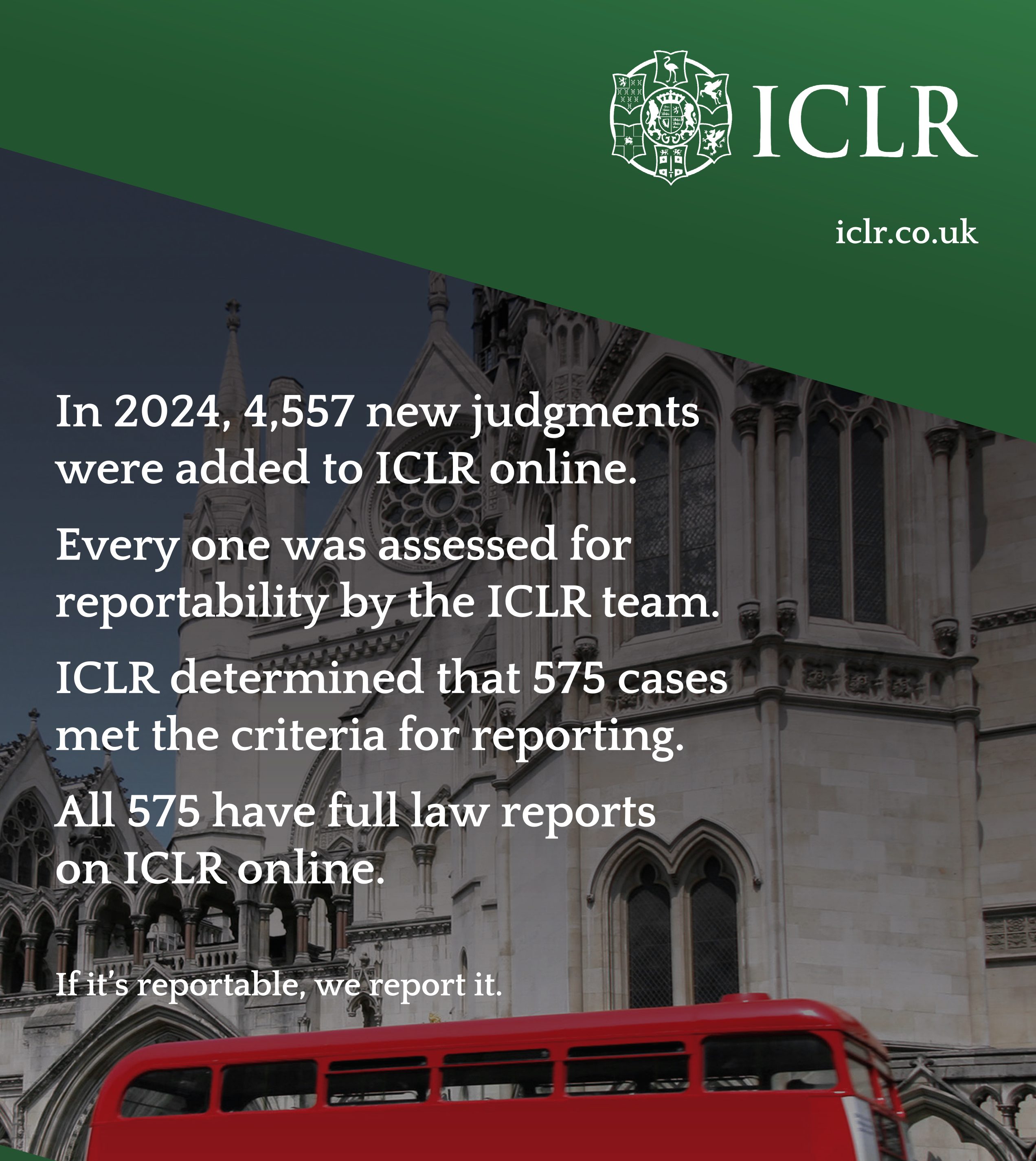
ICLR
If it's reportable, we report it.

From a Reader’s Lecture delivered on 9 October 2024 by Professor Louise Gullifer, Rouse Ball Professor of English Law, University of Cambridge.
I am delighted to be able to talk to you this evening about transnational commercial law, and the work of UNIDROIT. Transnational commercial law is an area of legal endeavour that is important for the world, for the ongoing development of trade, commerce and finance, and for the integration of private law across the world.
Commercial activity is one of the areas of law where the issues to be solved by law are pretty much the same everywhere. Examples of ‘old’ issues are those thrown up by global supply chains, the need for access to credit and dispute resolution. Examples of ‘new’ issues are those relating to the evolution of new types of assets and the shift in many areas of commerce to digitisation. States tackle these common issues in a way that reflects their own legal culture and system.
This leads to at least two problems. The first is that some states’ law will work better than others. The second is that market participants, and their lawyers, have to become familiar with, and deal with, many different rules. This leads to increased transaction costs.
Transnational law instruments can address these problems at their roots. They provide a text which reflects the ‘best’ law that can be designed to fit within every legal culture. Transnational law can either provide a uniform body of rules (‘hard law’), so that, in theory, the law in every state will be the same; or it can provide a model for states to adopt, to improve their domestic law and to achieve harmonisation (‘soft law’). This talk will address a number of basic questions about transnational commercial law.
There are three organisations doing this type of work. UNICTRAL is based in Vienna, was established in 1966 and is part of the United Nations. UNIDROIT is based in Rome and was founded by the League of Nations in 1926. The Hague Conference on Private International Law dates from 1893 and focuses entirely on conflict of laws instruments, though not necessarily on commercial law.
The primary argument is the resulting reduction of transaction costs, since the instrument obviates the need to ascertain the details of different laws in cross-border transactions. Second, the application of different laws leads to unpredictability and uncertainty, both as to which law may apply, and to the content of the law. Unification (or harmonisation) increases predictability and certainty. It also facilitates co-ordination in the provision of information. An example of this is the International Registry set up by the UNIDROIT Cape Town Convention (2001), which provides unified rules for the financing of mobile equipment.
The arguments in favour of unification and harmonisation are often countered by an argument that their benefits can be outweighed by those of regulatory competition. However, the regulatory competition argument only really works if there is complete freedom of choice, which works in some contexts (such as contract law) but not in others (such as property law). Moreover, regulatory competition can lead to a ‘race to the bottom’ resulting in sub-optimal law.
To discuss this, I need to explain the different types of instruments. Hard law consists of treaties and conventions which bind ratifying states. While very effective at harmonising law, they are costly and time-consuming to produce via a process which involves negotiations between state representatives. It also takes quite some time to get ratifications: their binding nature means that careful (and lengthy) consideration is required before states ratify. In the commercial sphere the support of market players is crucial here.
Alternatively, soft law instruments such as Model Laws and Principles are texts which are designed to be implemented by states into their national law with varying degrees of adaptation to enable them to be able to fit into existing law. It is quicker and easier to produce than hard law and provides flexibility for states in implementation.

ICLR
If it's reportable, we report it.
Trusted law reporting since 1865
In terms of the creation process, I am going to describe the methods used at UNIDROIT but the methods of the other organisations are similar, at least in outline.
First, a topic is chosen after a proposal from a government, an intergovernmental organisation such as the World Bank, an NGO, for example the International Swaps and Derivatives Association (ISDA), or an international financial institution such as the European Central Bank. All proposals go through an internal vetting procedure and then, in relation to each project, a working group of independent international experts from different legal cultures and countries is set up. Their discussion sessions are usually also attended by observers from international organisations, NGOs, industry and market players, who contribute to the debate and the drafting. After a number of meetings, a near-final draft is produced and sent out for public consultation.
There is a big difference between hard law and soft law as to how an instrument is adopted. A draft hard law goes to a committee of governmental experts (appointed by states) and then to a diplomatic conference, where state representatives discuss and amend the text before adoption. A draft soft law is finalised by the working group and then approved and adopted by the Governing Council.
Once adopted, the instrument can be implemented by states. In relation to hard law, a state has to ratify the treaty. This is a process internal to the state, but each of the transnational law organisations keeps a public record of ratifications of their instruments. Depending on the constitutional law of the relevant state, the treaty will either take effect as national law on its ratification (monist) or (as in the UK) it will take effect when implemented in national legislation, so that ratification and implementation go hand in hand.
The implementation of soft law is rather more interesting. A Model Law is a fully drafted legislative text that can just be implemented with very minor local modifications. See, for example, s.2(1) of the Cross-Border Insolvency Regulations 2006 implementing the UNCITRAL Model Law on cross-border insolvency 1997. However, implementation does not always have to be verbatim, see, for example, the UK Electronic Trade Documents Act 2023 implementing the UNCITRAL Model Law on Transferable Electronic Records 2017 (although this Model Law has been implemented nearly verbatim in some other states, such as Singapore).
Principles are not designed for specific linguistic enactment, but so that domestic law can be aligned with them. It may be that national law already reflects the principles (or some of them) in which case there is nothing to do in relation to implementation. Principles, however, may inspire states to craft their own law. For example, the UNIDROIT Principles on the operation of close-out netting provisions 2013 have been influential in the legislation of many states. Principles may also be reflected in parties’ contracts eg UNIDROIT Principles of International Commercial Contracts 1994 (2016).

ICLR
If it's reportable, we report it.
Trusted law reporting since 1865
Transnational commercial law instruments cover a wide variety of subject areas within the commercial sphere. Some instances have already been mentioned; this section will focus on just two examples.
The first is the UNIDROIT Model Law on Factoring 2023 (MLF). Factoring is a term used internationally for the sale of receivables to a financier in order to obtain immediate finance. Globally, it is considered particularly suitable for micro, small and medium sized enterprises (MSMEs), which generally suffer from a huge lack of finance.
The English law of assignment, which is complicated but flexible, facilitates this type of finance and is very widely used. However, in many countries, particularly in developing economies, there are frictions and barriers to a smooth receivables financing market, such as formal requirements, which mean that it is impossible to do this type of financing without paper, and a lack of clear priority rules, which leads to a concern about fraud. The MLF project was proposed by the World Bank Group, which wants to use factoring as a way of increasing access to credit in developing economies. The idea was to have a targeted set of rules, which a state can enact reasonably easily without having to change their entire law on secured transactions. The MLF includes a simple method of effecting factoring transactions, a national notice-based registry for such transactions, and clear priority rules based on registration, which reduces dramatically concern about fraud. The MLF is a good example of how transnational commercial law can improve the domestic law through harmonisation.
A current UNIDROIT project is on the Legal Nature of Verified Carbon Credits (VCCs). This project concerns carbon credits that are created for trading in the private markets, as opposed to those created for compliance with legal regimes imposing caps on emissions. VCCs are a means of financing projects designed to remove carbon emissions from the atmosphere or to reduce the amount of carbon emitted, such as carbon capture and planting of forests. Once a project has successfully removed a certain amount of carbon, that fact is verified by an independent verifier as, say, removing 1,000 tonnes of CO2 from the atmosphere. The verification is used to issue 1,000 VCCs, which are credited in a registry to the account of the person who removed the carbon. That person can then transfer the VCCs or any of them to other people: traders, or businesses who themselves emit carbon. A credit can be ‘used’ by a business when stating how it is meeting its aim to be carbon neutral. At this point it must retire the VCCs, which cannot then be transferred to anyone else, thus preventing double counting.
The VCC project aims to provide principles of private law, which will bring some legal certainty and enable the secondary market to be scaled up. The first problem, then, is to work out how these things can be the object of proprietary rights. The problem is that, unlike securities, VCCs don’t represent any rights against anyone. Nor are they tangibles, as they are not issued electronically. So the challenge is to explain, in a way that will make sense to all jurisdictions, how they can be the object of proprietary rights, that is, rights with third party effects, and then to work out how private law rules can apply to the registries, to custodians, the taking of security over VCCs, and whether there should be a taking free rule (a ‘nemo dat’ exception) when VCCs are transferred, in the way that most jurisdictions have a taking free rule in relation to securities.
One major challenge is to decide whether we are responding to how the market is now, or to try and shape the market for the future. This is a difficult project, and a very important one that could have a major effect on the financing of green projects, especially in developing economies.
Hard law is expensive to produce and may not lead to unification. For example, the UNCITRAL Convention on the International Sale of Goods 1980 (CISG) can, and often is, excluded by contracting parties even where it would otherwise apply. Another example is the UNIDROIT Geneva Securities Convention 2009 (GSC), which has no ratifications at all. However, a treaty, even if not used as a treaty, may become the basis for national law reform. The CISG has acted as an inspiration for law reform in the area of sale of goods, especially in civil law jurisdictions. Despite not being a ratified treaty, the principles in the GSC have found their way into intermediated securities law in many countries.
Realistically, the future is probably mainly in the creation of soft law, which not only is easier to create, but which has considerable international power coming from its flexibility. Soft law is seen as less threatening by states and is therefore more likely to be adopted in some form or other, as well as being easier to negotiate, and has become an important tool for economic progress in developing economies. It also plays a role as a standard setter (demonstrating what a ‘good’ and ‘best practice’ law looks like) and an educational tool. As a legal culture neutral model, it is easier to use than any particular national law, which requires an understanding of the general legal culture of the relevant state. Soft law can also be used to promote market certainty, as, for example, in relation to VCCs.
First, it can examine commercial law treaties carefully and decide whether there are good reasons to ratify. For example, will it result in a wider market for the UK or enable UK businesses to access finance more easily? It should also consider whether UK ratification would be seen as setting an example. Hard law works better the more states ratify the treaty. Once there is a critical mass of ratifications, other states will join; thus, states seen as leaders in commercial law can lead by example and encourage other states to ratify.
How else can the UK contribute? The UK can provide experts to be involved in development and drafting of instruments. English lawyers have very deep common law experience, and our drafting style is prized: ‘English English’ is still at a premium as is our succinct drafting. But it is a two-way street. We can also learn from international instruments to improve our law. For example, in the course of its work on digital assets, the Law Commission of England and Wales attended the sessions of the UNIDROIT project, enabling a very helpful sharing of ideas.
In relation to transnational commercial law, any state has a choice: to embrace harmonisation (and unification where relevant) or to go it alone. The UK has an even more important choice, since English law is seen as a globally leading law. We can be either global leaders or outliers. The picture is quite mixed: we are very involved in some areas, and less so in others (for example, the CISG and secured transactions law reform). But even in these areas, I, and many others, are engaging academically and practically, and walking both ways down the two-way street. We are still very fortunate to be seen as global leaders in this area at the moment: the future is in the hands of the next generation of academics and practitioners.
Louise Gullifer
Rouse Ball Professor of English Law, University of Cambridge
For the full video recording:
innertemple.org.uk/unidroit
